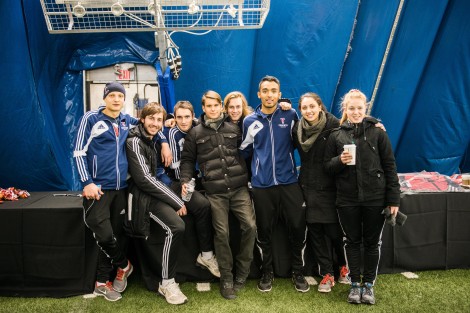Varsity Centre served as a meeting point for over 350 soccer coaches from across the country, eager to impart their knowledge and learn new approaches from some of the game’s best minds and clinicians at the 2013 National Soccer Coaching Conference this weekend.
Following the success of last year’s inaugural conference, Varsity Blues manager of soccer operations and men’s team coach Anthony Capotosto hoped participants would leave the symposium with knowledge of the game at a higher level and with insights that could be shared with players in their own communities.
“It is through our own personal education and development that we will ultimately raise the standard of play in Canada,” said Capotosto. “Through continuous professional development and education, a coach is able to fulfill his top responsibility of fostering the growth and development of his own players.”
The group of assembled clinicians and guest speakers tasked with leading the sessions had experience at the national, international, and professional levels. They included Sasho Cirovski, who has spent over two decades at the helm of the University of Maryland’s two-time ncaa Division I National Championship winning men’s squad; Gordon Forrest, head coach of the Vancouver Whitecaps’ u-18 team; and Thomas Rongen, Toronto fc’s academy director. Athletes from the Varsity Blues men’s and women’s soccer teams and the Toronto FC Academy participated in the on-field demonstrations.
A continuously reiterated sentiment over the weekend was that coaching education should be a never-ending process.
“Once upon a time, it was common practice for soccer players in many European countries to eat meat and potatoes on game days, but then we did research that revealed that this was a problem, and now it is uncommon to see that type of meal consumed before a game,” professor Ira Jacobs, the University of Toronto’s Dean of Kinesiology, explained. “Knowledge is continuously evolving and it is a coach’s responsibility to his players to keep up with these developments.”
The importance of conferences in re-educating coaches in order to better develop players cannot be understated. The Canadian men’s national soccer team’s humiliating 8–1 defeat to Honduras in the 2014 World Cup qualifying round and the growing exodus of Canada’s top players to European clubs have heightened the debate over what must be done to better develop players. Many prominent voices in the Canadian soccer landscape, including tsn’s Jason deVos and cbc contributor Ben Rycroft, have long insisted that the best and most practical solution is to ensure that clubs invest money in systemic, year-round coaching training and education.
Bob de Klerk, a former youth-team coach for the storied Dutch club Ajax fc and a former assistant coach for Toronto fc, shared this sentiment following his presentation on the Ajax youth system — widely regarded as one of the best in the world for having produced players such as Wesley Sneijder, Johan Cryuff, and Dennis Bergkamp. When asked why over the past decade the Ajax youth academy has been able to produce some of the world’s best players but none at the level of a Lionel Messi or Diego Maradona, de Klerk said the development of big game players depends on the abilities of the coaches — an area he admits the Ajax academy is working to improve.
Still, de Klerk acknowledged that the Canadian situation is a complicated one. While he chose not to comment on the reason why, he and fellow Ajax academy coach Aron Winter were unable to implement their Dutch brand of Total Football at Toronto fc, de Klerk said, “The culture in Europe and at Ajax is special and totally different from the culture in North America and Toronto. Because of this, it will take a great deal of time to see any potential results.”
Liam Tiernan, who has coached at the U-8 level for almost a decade, was one of the coaches in attendance from the Kitchener Soccer Club. He agreed that the failure of the country to achieve success at the national team level is a complicated issue. One of the problems, he said, was that soccer is primarily a middle-class sport in this country. “Kids who are playing it are not striving to make it their livelihood,” he explained, advocating a reworking of this mentality.
Tiernan expressed a belief that the key to soccer success in Canada is to better develop and educate coaches, a goal these types of conferences help to achieve. “At every conference, you can learn so many difference concepts, philosophies, and approaches that you can adopt, and of course some that you learn that you would never dream of employing.
“The important thing is that we all share our knowledge and learn from each other, and this is an event that helps facilitate that.”




